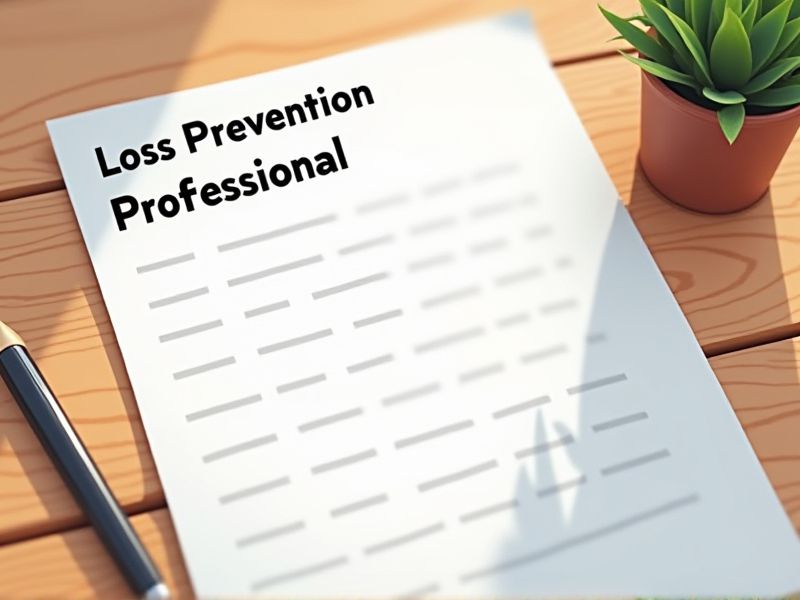
Loss Prevention Professionals face complex challenges that require a deep understanding of security measures and risk management. Certifications provide standardized knowledge crucial for effectively implementing and maintaining loss prevention strategies. They also demonstrate a professional's commitment to staying current with industry standards and best practices. Key certifications enhance a professional's competency in these critical areas.
Certified Protection Professional (CPP)
Having a Certified Protection Professional (CPP) certification boosts a loss prevention professional's credibility by validating their comprehensive understanding of security principles. The rigorous CPP exam enhances their strategic planning and risk management skills, crucial for safeguarding organizational assets. Companies are more likely to trust individuals with a CPP certification, as it indicates a commitment to upholding industry standards and ethics. This credential can open doors to advanced career opportunities and higher salary potential within the field of loss prevention.
Physical Security Professional (PSP)
A Physical Security Professional (PSP) is crucial for a Loss Prevention Professional due to the need for strategic asset protection, reducing potential theft. Expertise in security assessments helps identify and reinforce vulnerabilities in physical infrastructure. Proper PSP implementation ensures compliance with industry standards, aiding in the creation of a secure environment. Expertise in crisis management allows effective response to incidents, minimizing operational downtime and financial losses.
Professional Certified Investigator (PCI)
Loss prevention professionals enhance their credibility and industry knowledge by obtaining the Professional Certified Investigator (PCI) certification. This credential equips them with advanced techniques for effective investigation and resolution of theft and fraud incidents. The structured PCI training enhances analytical skills, leading to more efficient identification of suspicious activities. Companies see improved security outcomes and minimize losses with PCI-certified staff overseeing risk and investigative functions.
Certified Fraud Examiner (CFE)
Loss prevention professionals benefit from Certified Fraud Examiner (CFE) credentials as they provide specialized knowledge in identifying and preventing fraudulent activities, which directly impacts reducing financial losses. The comprehensive training in fraud detection and deterrence enhances the capability of loss prevention staff to implement effective anti-fraud measures. A CFE's expertise in legal aspects of fraud assists organizations in developing robust compliance programs and mitigating legal risks. As fraud schemes evolve, the continuous education requirement for CFEs ensures that loss prevention strategies remain current and effective.
Certified Security Consultant (CSC)
Incorporating a Certified Security Consultant (CSC) into a loss prevention strategy enhances the identification and analysis of vulnerabilities in security systems. CSCs bring specialized knowledge that aids in crafting solutions tailored specifically to mitigate theft and fraud risks. Their expertise in security protocols and risk assessment ensures more robust preventive measures are established. This engagement results in a significant reduction in loss incidents and potential financial liabilities.
Certified in Risk and Information Systems Control (CRISC)
Certified in Risk and Information Systems Control (CRISC) equips a Loss Prevention Professional with the necessary skills to identify, assess, and mitigate IT-related risks, crucial for protecting organizational assets. It enhances their ability to align risk management strategies with business objectives, which is vital for comprehensive loss prevention. Holding a CRISC certification signifies expertise in critical areas like risk assessment, response, and control monitoring, ensuring efficient and effective loss mitigation. Organizations value CRISC-certified professionals because they bring a structured, standard-compliant approach to managing risk and security, ultimately safeguarding business value and reputation.
Certified Safety Professional (CSP)
A Certified Safety Professional (CSP) brings a recognized standard of expertise and credibility essential for effectively identifying and mitigating workplace hazards. Having a CSP helps organizations reduce the incidence of accidents and injuries, ultimately preventing costly losses and downtime. Regulatory compliance becomes more streamlined when a CSP is involved since they possess up-to-date knowledge of safety standards and regulations. A CSP enhances a company's reputation and demonstrates a commitment to safety, often leading to increased trust from clients and employees.
Certified Internal Auditor (CIA)
Possessing a Certified Internal Auditor (CIA) credential leads to enhanced risk assessment skills, which are crucial for identifying potential threats to assets. This certification equips professionals with the knowledge to implement robust internal controls, effectively reducing the likelihood of losses. Understanding auditing concepts enhances a professional's ability to analyze financial statements for discrepancies, facilitating early detection of fraud or theft. The ethical standards associated with the CIA designation promote integrity and accountability, critical for maintaining trust and compliance within an organization.
Certified Ethics and Compliance Professional (CECP)
Loss prevention professionals with CECP certification typically demonstrate a comprehensive understanding of ethical and compliance standards, which assists in identifying and mitigating internal and external risks. This certification often equips professionals with skills to develop policies and procedures that align with legal and regulatory requirements, reducing the possibility of organizational penalties. The CECP certification tends to promote a culture of ethical behavior within the organization, which is critical for maintaining stakeholder trust. Certified professionals often have the ability to handle sensitive situations with discretion and integrity, crucial for effective loss prevention.
Project Management Professional (PMP)
Project Management Professional (PMP) certification provides structured methodologies that can enhance loss prevention strategies by ensuring systematic planning and execution. It equips professionals with leadership and communication skills critical for coordinating multidisciplinary teams in loss prevention efforts. PMP emphasizes risk management, aligning closely with loss prevention goals of forecasting and mitigating potential risks. Having a PMP certification underscores a professional's commitment to continuous improvement and adherence to best practices, credentials that are valuable in the field of loss prevention.
Summary
When you obtain certifications as a Loss Prevention Professional, your expertise becomes more credible, leading to increased trust from employers. This enhanced credibility can result in better job opportunities and career advancement. Companies prioritize hiring certified professionals to reduce risks and efficiently manage assets. You may also gain access to a network of industry experts, expanding your knowledge and resource-sharing opportunities.
